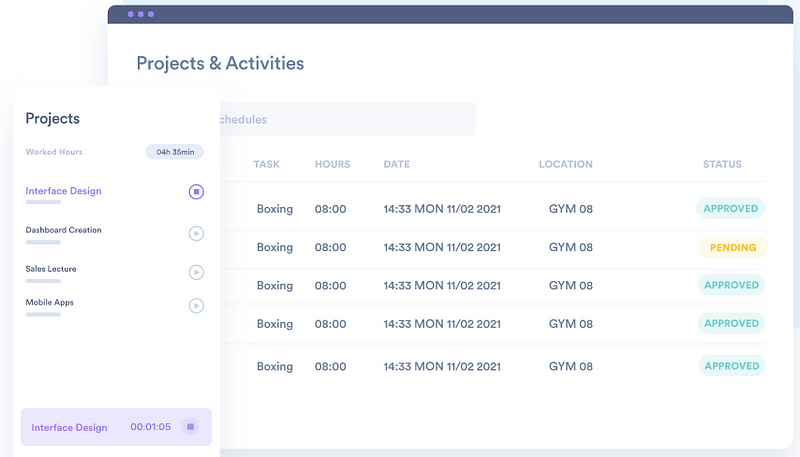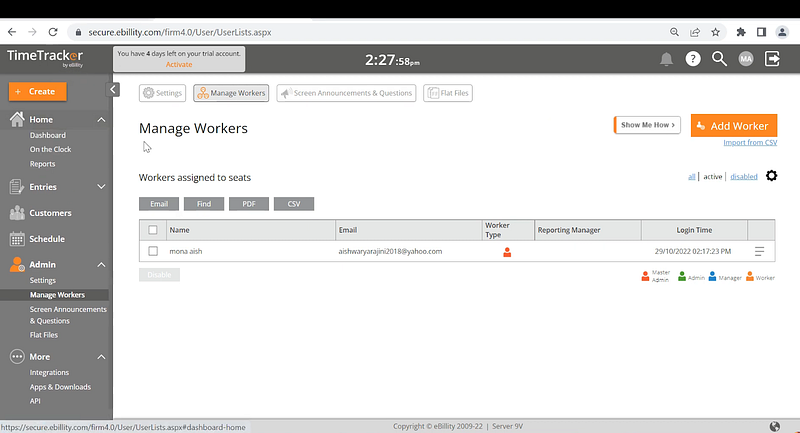In today’s legal landscape, time is money. Every hour spent on a client matter is an hour that can be billed, and every minute wasted costs you revenue. That’s why accurate timekeeping is essential for law firms and individual lawyers to succeed. Law firms can optimize productivity, streamline operations, and increase profitability by tracking attorney billable hours.
With numerous available solutions for managing billable hours in the market, deciding which one best suits your needs can be challenging.
In this article, we’ll discuss the benefits of tracking attorney billable hours, ideal practices for effective timekeeping, and the top applications for tracking lawyer’s billable hours. Let’s get started!
We’ll go over the following topics:
- What is Attorney Billable Hours Tracking?
- Top Benefits of Tracking Billable Hours for Law Firm
- Best Practices for Law Firm Billable Hours Tracking
- Challenges with Tracking Billing Hours for Lawyers
- Implementing Time Tracking: Best Apps for Tracking Billable Hours for Lawyers
- Wrap-up: Optimize Profitability with Attorney Billable Hours Tracking

What is Attorney Billable Hours Tracking?
Attorney billable hours tracking is the process of recording and managing the time that lawyers spend on client matters. This information generates invoices, calculates payments, and monitors attorney performance. The practice is especially popular among prominent law firms since they must closely monitor all their attorneys’ billable hours.
Legal professionals and firms can track several metrics, including the time spent preparing a case, court appearances, negotiations, and client communication. Accurate billing hour tracking helps firms quantify their value to clients and ensure they charge for all services rendered.
Separating Nonbillable and Billable Hours for Lawyers
It’s essential to differentiate between billable and nonbillable hours when tracking attorney billing hours. Non-billable tasks include administrative duties, internal meetings, staff training sessions, and professional development activities. On the other hand, billable tasks are those that can be directly charged to a client or matter.
Generally speaking, lawyers should strive for 80% of their time spent on billable tasks for maximum efficiency and profitability. Tracking time against these two categories helps firms measure their performance accurately. It also ensures that attorneys adequately provide services without wasting valuable resources on non-revenue-generating activities like research or personal emails from clients.

9 Top Benefits of Tracking Billable Hours for Law Firm
Tracking billable hours helps with many aspects of the legal industry and offers several benefits to law firms. Here are some of the most notable advantages:
1. More Billable Hours and Profitability
One of the primary benefits of tracking attorney billable hours is the potential for increased profitability. Law firms can monitor their timekeeping closely and ensure they are not wasting resources. Consequently, law firms can maximize their billable hours by focusing more on profitable activities instead of non-billable tasks like administrative work or attending meetings. This practice helps law firms optimize their profits and better manage expenses.
Everyday legal activities for billable hours include:
- Drafting documents
- Preparing legal opinions
- Researching and analyzing the law
- Attending court appearances
- Negotiating settlements
2. Streamlined Billing Experience
Tracking attorney billable hours also helps streamline the billing process. Law firms can use time tracking software to easily generate invoices, track payments, and manage client accounts. This is especially helpful for law firms that handle large volumes of clients since it eliminates manual data entry and reduces errors associated with manual calculations.
With automated time tracking, attorneys no longer need to manually enter their hours into spreadsheets or write them down in a notebook. All they have to do is add entries into the system whenever they start and end a task related to a specific client matter. The software will automatically calculate their total billable hours and generate invoices with accurate billing information.
3. More Efficient Management of Law Firm
Time tracking also allows law firms to manage their operations better. With accurate records of billable hours, managers can monitor the performance of individual attorneys and measure the effectiveness of different legal strategies.
This helps them identify areas for improvement and make decisions that optimize profitability. Additionally, it gives law firms a clear picture of their entire operation so they can allocate resources more efficiently.
4. Improved Client Communication
Lawyers can significantly improve their client communication by tracking billable hours. Tracking time allows attorneys and firms to provide clients with an accurate estimate of the services they can expect for a given price. This practice helps ensure no surprises regarding invoices or pricing, and efficient billing allows lawyers to better manage expectations throughout the case process.
5. Performance Tracking and Trend Analysis
Law firms can compare each lawyer’s performance to the firm’s overall performance, which can help identify potential problems or successes more quickly. Additionally, tracking data helps managers analyze trends within their business and stay ahead of any changes in the legal industry that may affect productivity or profitability.

6. Team Accountability
When you have an entire team of attorneys working on different cases, it is important to ensure everyone is doing their job correctly. Billable hours tracking provides a more transparent view of each attorney’s performance and helps managers identify any issues quickly. Also, you can compare performance on similar cases to determine which lawyers are the most efficient or successful in certain areas.
7. Improved Budgeting and Resource Planning
Law firms can use billable hours tracking to help plan for future projects or cases. Knowing how long it takes to complete each task or case lets you better estimate the resources needed and allocate the necessary budget, ensuring that no time is wasted on unnecessary tasks. Additionally, law firms can identify potential areas for cost savings by analyzing their tracking data over time.
8. Enhanced Cost Control
One of the most critical elements for any business, including law firms, is understanding their costs. Tracking billable hours helps law firms better understand their expenses and manage resources more efficiently. Firms can monitor every aspect of their business and ensure they are not overspending on any particular task or service. This practice helps law firms stay competitive in the legal market by keeping prices low while providing quality services to clients.
9. Customized Reporting
Attorneys can customize their tracking and reporting to meet the needs of each client. This practice helps attorneys provide clients with detailed reports on the time spent on specific tasks or cases. Customized billing permits attorneys to manage expectations better, quantify value, and ensure clients receive a fair exchange for services rendered.
Best Practices for Law Firm Billable Hours Tracking
To maximize the benefits of tracking attorney billable hours, law firms should follow these best practices:
- Set time budget: Law firms should set a time budget for each project to ensure that attorneys are not overworking. This encourages lawyers to be more productive and efficient in their work. It also helps them stay on top of deadlines and gives clients an idea of the final fee before they sign any contracts.
- Document all activity: Lawyers should document all activities related to client cases, including emails, phone calls, meetings, research sessions, court appearances, etc. Accurate documentation allows firms to calculate billable hours at the end of a project completed accurately.
- Monitor attorney performance: Law firms can identify which attorneys are the most productive and efficient by tracking billable hours. This allows them to reward their best performers with bonuses or promotions.
- Update client billing: Billing hour tracking helps ensure clients are billed only when they work on a case. This eliminates invoice discrepancies and ensures that clients do not receive over-inflated bills.
- Clear internal and external communication: Legal businesses should communicate their billing hour policies with clients and internal staff. This helps avoid misunderstandings, disputes, and payment delays.
Challenges with Tracking Billing Hours for Lawyers
Tracking billable hours for lawyers can also be challenging. Lawyers may avoid logging their time due to its tedious nature or fear of being held accountable for every minute they spend on a case. This could lead to inaccurate records and even loss of profits if the firm fails to charge clients adequately.
However, automated solutions can make tracking attorney billable hours easier. Automated software helps attorneys accurately track their time by automating manual processes and eliminating human error. This ensures legal professionals are more accurate and efficient in capturing every minute spent on a case.
Another challenge is how the clients are billed. Clients may be reluctant to pay for attorney time they consider unnecessary or inefficient. To make sure clients understand the fees and services provided, firms must clearly communicate their billing system and what’s included in the fees.
Again, automated law firm billable hours trackers can help with this by providing transparency and real-time data sync. Those digital apps help firms to accurately capture and bill for their services, making it easier for clients to understand the charges.
3 Best Apps for Tracking Billable Hours for Lawyers:
Law firms must select the right time-tracking software to accurately monitor their attorneys’ billable hours. There are many different legal time-tracking applications available. Below we’ve listed some of the best ones:
1. Day.io – Overall, the Best App to Track Billable Hours for Lawyers

Day.io is a powerful, cloud-based legal time-tracking software that helps law firms and attorneys track their billable hours accurately. Day.io allows for easy invoicing and billing with integrated reporting capabilities to easily view the status of a firm’s billable hours at any given moment. The platform also offers customizable workflows, enabling firms to streamline their operations by automating client communication and document management tasks.
The comprehensive project and billing tracker lets you view the status of individual cases, tasks, and billable hours. It also offers detailed reporting capabilities to track your firm’s performance over time.
Features
- Time-tracking for individual projects and legal cases
- Secure digital signature management for documentation
- Paid time off approval management for streamlined HRM experience
- Detailed project reports with profitability analysis
- Cost and billing details to help with accurate financial projection and performance review
- Automated invoice creation from cloud-based timesheets
Pricing
- Attendance & time tracking: $4 per user/month
- Project time tracking: $6 per user/month
2. PracticePanther – All-in-one Cloud-based Law Firm Management Solution

PracticePanther brings all of your firm’s legal operations under one roof. It is a comprehensive law practice management solution, offering multi-factor authentication, case management, document automation tools, client and task tracking capabilities, calendar sharing with clients and other attorneys, billing solutions for flat fees and hourly rates, and accounting integration options for QuickBooks Online or Xero.
Features
- Secure cloud-based time tracking with multiple integrations
- Customizable invoice templates and payment plans
- Secure document management via an integrated document system
- Real-time case updates to keep all team members informed
- Integrated task list for keeping track of projects and deadlines
Pricing
- Solo: $59 per user/month
- Essential: $79 per user/month
- Business: $99 per user/month
3. eBillity – Solid Option for Tracking Attorney Billable Hours

eBillity is a powerful solution for tracking attorney billable hours. It allows you to track detailed time entries and export reports in various formats, including Excel or CSV. The software also features project forecasting and management tools and customizable invoicing options. Additionally, the software provides automated reminders and notifications to ensure timely client payments.
Features
- Time-tracking with detailed time entries
- Data security features, including 256-bit encryption
- Real-time analytics to monitor attorney performance and profitability
- Integrations with popular legal practice management software
- Export reports in various formats, including Excel or CSV
Pricing
- Time tracker: $9 per user/month, plus $15 per month base fee
- Time Tracker Premium: $15 per user/month, plus $25 per month base fee
- LawBillity: $30 per user/month, no base fee

Wrap-up: Optimize Profitability with Attorney Billable Hours Tracking
Accurate timekeeping is a must for any law firm seeking success in today’s competitive market. By tracking attorney billable hours, businesses can boost productivity, streamline operations, and maximize profitability.
Regarding finding the perfect tool for the task, Day.io stands out as one of the top attorney billable hours trackers. Boasting an intuitive interface, robust features, and affordable pricing – Day.io is just what lawyers need to take their timekeeping game up a notch!
So don’t delay; sign up with Day.io now and start supercharging your law firm’s profits!

